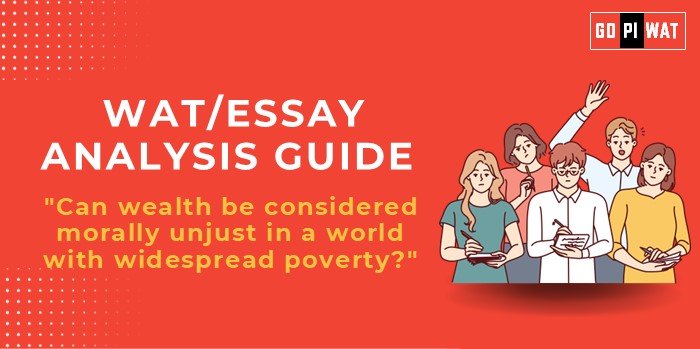📋 Written Ability Test (WAT)/Essay Analysis Guide
🌐 Understanding the Topic’s Importance
Wealth’s moral justification amid poverty highlights ethical considerations vital for leaders addressing global inequalities, making it a compelling topic for B-school essays.
🕒 Effective Planning and Writing
Time Allocation
- Planning: 5 minutes
- Writing: 20 minutes
- Review: 5 minutes
Preparation Tips
- Note key data points and global examples.
- Organize arguments: for, against, balanced view.
✍️ Introduction Techniques for Essays
- Contrast Approach: “While global billionaires grow richer, over 700 million people face extreme poverty daily. This juxtaposition raises questions about wealth’s moral standing.”
- Solution-Based Introduction: “Redistributing wealth through fair taxation could bridge the gap between the ultra-rich and the impoverished, fostering global equity.”
📚 Structuring the Essay Body
Achievements
- Highlight philanthropy’s role in reducing poverty.
- Discuss wealth-driven innovations like affordable healthcare.
Challenges with Comparative Analysis
- Address exploitation concerns and inequitable systems.
- Compare Nordic equality models with laissez-faire systems like the US.
Future Outlook
- Suggest universal basic income (UBI) or wealth taxes as potential solutions.
📝 Concluding Effectively
- Balanced Perspective: “While wealth can be a force for good, its morality hinges on ethical use and systemic fairness.”
- Global Comparison: “Nordic nations’ equitable wealth distribution proves that moral capitalism is achievable.”
📊 Analyzing Successes and Shortcomings
- Key Achievements: Growth in philanthropy and CSR practices.
- Ongoing Challenges: Wealth hoarding and ineffective redistributive policies.
- Global Context: Highlight successful redistribution models.
💡 Recommendations for Sustainable Progress
- Introduce progressive tax systems.
- Incentivize CSR beyond financial motives.
- Strengthen global partnerships for poverty alleviation.
🖊️ Sample Short Essays
Balanced Perspective
“Global wealth disparity challenges the ethical foundation of wealth in modern society. While philanthropy helps, systemic redistribution remains vital.”
Solution-Oriented
“Fair taxation and CSR-driven policies can ensure wealth serves as a catalyst for equity, not exclusion.”
Global Comparison
“By emulating Nordic welfare models, nations can reconcile wealth with morality, fostering inclusive prosperity.”


